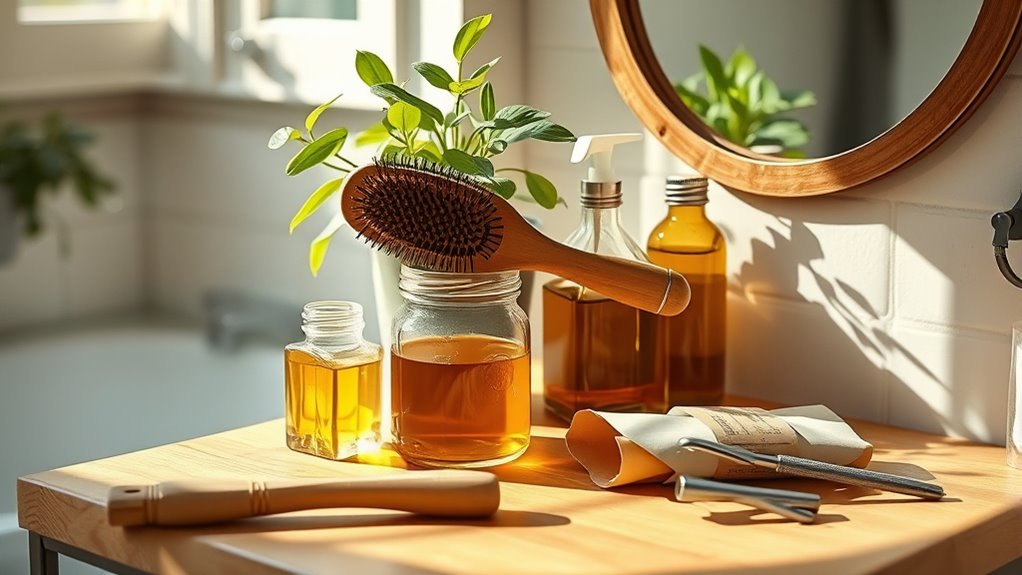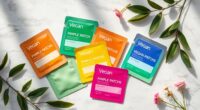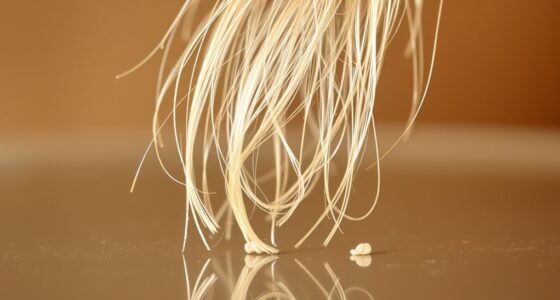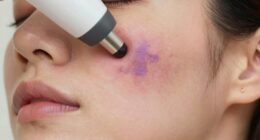If you want to adopt eco-friendly hair care habits, start by choosing sustainable products with natural ingredients and minimal packaging. Invest in tools made from bamboo or recycled materials, and wash your hair less often to save water. Air-drying hair and using DIY treatments can also reduce energy use. Support salons that prioritize eco-friendly practices. These small changes can make a big difference, and there’s plenty more to discover about creating a sustainable beauty routine.
Key Takeaways
- Choose hair products with natural ingredients and eco-certifications to support sustainable practices and minimize environmental impact.
- Opt for eco-friendly tools like bamboo brushes and silk scrunchies to reduce waste and avoid microplastics.
- Wash your hair less frequently and use dry shampoo to conserve water and maintain natural oils.
- Seek out salons that prioritize sustainability and use environmentally conscious products and practices.
- Engage in DIY hair treatments with kitchen staples to reduce packaging waste and promote sustainable beauty routines.
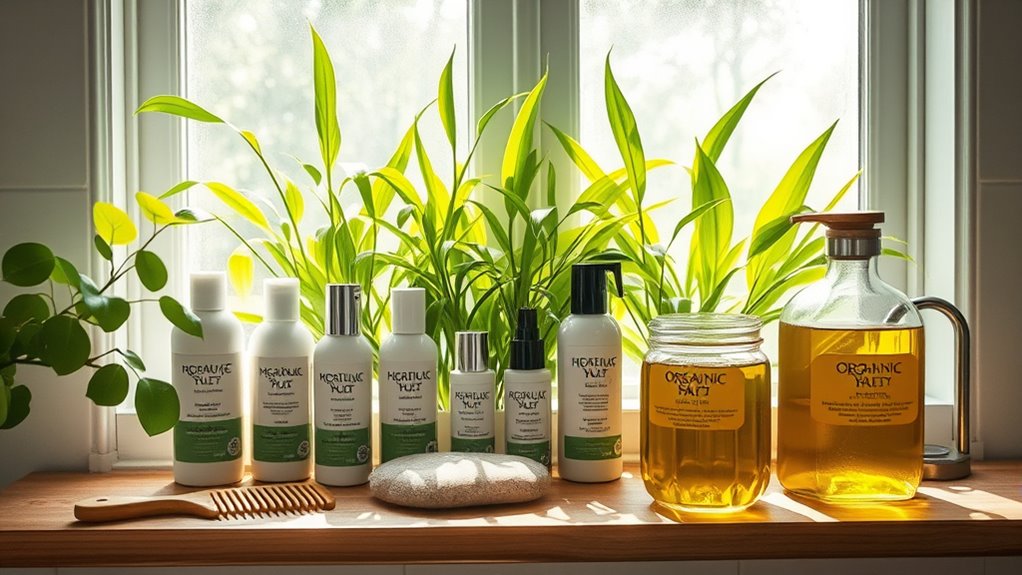
As you endeavor to live more sustainably, don’t overlook the impact of your hair care routine. The products you choose can greatly affect the environment, so it’s time to make some mindful changes. Start by opting for sustainable hair products that feature natural ingredients, like argan or coconut oil. These plant-based components aren’t only gentler on your hair but also better for the planet.
Consider the environmental impact of your hair care routine and choose sustainable products with natural ingredients for a greener lifestyle.
When shopping, pay attention to the packaging, too. Select brands that use biodegradable or refillable packaging to help reduce plastic waste. You’ll also want to support cruelty-free brands by looking for certifications like Leaping Bunny. These indicators assure you that no animals were harmed in the making of your products. Eco-certifications, such as B Corp or USDA Organic, further confirm a brand’s commitment to sustainability. Additionally, minimal packaging is a plus; it’s a simple way to decrease your environmental footprint.
Don’t forget about the tools you use! Invest in eco-friendly brushes made of boar bristle or bamboo. These options are durable and biodegradable, making them a fantastic choice for your hair care arsenal. Instead of synthetic hair ties, consider switching to silk scrunchies to cut down on microplastic pollution. Combs made from recycled materials or sustainable wood also help you maintain a greener routine. Using scratching posts can also redirect negative behaviors in pets, ensuring a more harmonious home while you focus on your sustainable habits. The implementation of sustainable practices can significantly enhance your overall well-being and contribute to environmental health.
If you’re feeling crafty, you could even make DIY hair ties using natural fibers like cotton or wool. Water and energy conservation is another essential aspect of eco-friendly hair care. Try washing your hair less frequently—2-3 times a week is ideal. This not only saves water but also allows your hair to maintain its natural oils. Using air purifiers can further improve indoor air quality, benefiting your overall hair health.
Air-drying your hair instead of using heat styling tools can save energy and protect your locks. On non-wash days, dry shampoo can extend the life of your style while reducing water usage. You might also consider DIY hair treatments to minimize packaging waste. Kitchen staples like coconut oil, aloe vera, and apple cider vinegar work wonders for your hair.
Homemade masks with avocado, honey, and olive oil nourish your hair while giving you full control over the ingredients. Finally, when seeking professional help, look for sustainable salons that prioritize eco-friendly practices. Montessori toys can also inspire creativity in other aspects of life, making your hair care routine as environmentally conscious as possible. Supporting local, certified salons encourages community sustainability, making your hair care routine as environmentally conscious as possible.
Frequently Asked Questions
What Are the Benefits of Using Eco-Friendly Hair Care Products?
Using eco-friendly hair care products offers numerous benefits.
You’ll enjoy healthier hair thanks to natural ingredients that nourish and strengthen your locks. These products minimize irritation by avoiding harsh chemicals, leading to a happier scalp.
You’ll also contribute to a cleaner environment since many are biodegradable and come in recyclable packaging.
Plus, supporting these brands promotes ethical practices, ensuring cruelty-free options and fair labor, all while providing value and innovation in your hair care routine.
How Can I Make My Own Hair Care Products at Home?
Imagine transforming your kitchen into a beauty lab! You can create your own hair care products at home using simple ingredients.
For a natural shampoo, blend castile soap with baking soda and a splash of apple cider vinegar.
Whip up a conditioner with shea butter and jojoba oil for smooth locks.
Don’t forget to craft hair masks using honey and kokum butter for deep hydration.
It’s fun, rewarding, and you’ll love the results!
Are There Eco-Friendly Options for Hair Dyeing?
Absolutely, there are plenty of eco-friendly options for hair dyeing! You can choose natural dyes made from plant-based ingredients like henna and indigo, or opt for low-ammonia commercial products that reduce environmental impact.
Brands like Naturtint and Lush offer sustainable choices. If you’re into DIY, try using ingredients like beet juice or chamomile.
Remember to look for recyclable packaging and cruelty-free certifications to make your hair dyeing routine even greener!
What Should I Look for in Eco-Friendly Hair Care Labels?
When you immerse yourself in eco-friendly hair care, it’s like discovering a treasure chest of wonders!
Look for labels that highlight natural ingredients, organic certification, and biodegradable formulas.
Check for cruelty-free certifications to guarantee no animals were harmed.
Avoid products with harmful chemicals like parabens and sulfates, and opt for recyclable or compostable packaging.
This way, you’re not just caring for your hair but also for the planet, making a significant impact!
How Can I Recycle Old Hair Care Containers Properly?
To recycle old hair care containers properly, start by checking your local recycling guidelines.
Rinse out any remaining product and remove pumps, discarding them in regular waste if they can’t be reused. Many containers can go in your curbside recycling, but be mindful of what materials are accepted in your area.
For hard-to-recycle items, consider joining specialty programs like TerraCycle. Engaging with community initiatives can also boost your recycling efforts.
Conclusion
Making eco-friendly choices in your hair care routine isn’t just a trend; it’s like planting a seed for a lush, sustainable future. Think of each product swap as watering that seed, nurturing it to grow into a vibrant tree that benefits both you and the planet. You’ll soon realize that these small changes can lead to a forest of positive impact. So why wait? Start today, and watch your hair—and the Earth—thrive together.
